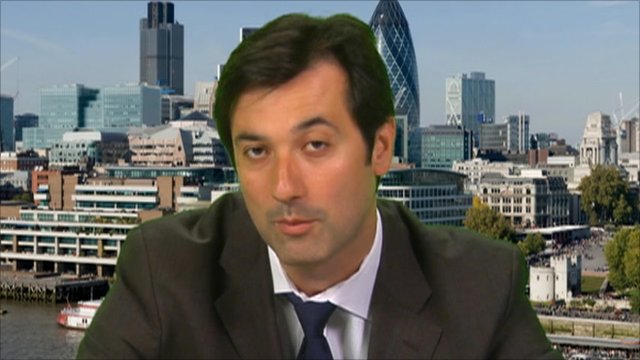Photo: Ethnos
The long awaited roundtable with the Greek government, which was originally supposed to take place in late April but due to the 6 May elections was postponed until early June and then, because of the June elections was postponed until today, was actually held. Well, it was far from what was announced. For example, supervisory Troika representatives, who will probably arrive in Athens on Wednesday, were absent from the agenda. Prime Minister Antonis Samaras, whose eye disease had apparently become serious and did not allow him to speak at the forum, was absent too.
Of course, this is not diminishing the importance of the round table, which was opened by the Member of the Executive Board of the European Central Bank Joerg Asmussen. "The difficulties that Greece is currently experiencing do not stem from the programme agreed with the Troika. They stem from many years of unsustainable economic policies," he said firmly. In his opinion, confidence in the euro area and its competitiveness could be restored through a combination of measures to be taken inside the countries themselves and reforms in the euro area institutions.
 "Institutional reforms at the organizational level cannot be a substitute for national reforms. Both types of measures should be taken in parallel," the representative of the European Central Bank warned. He recalled that Greece has done much to reduce its budget deficit from 15% to 9%, but it is not enough. Greece continues to form a primary budget deficit and the debt-to-GDP ratio is far from being considered a sustainable ratio of 120%.
"Institutional reforms at the organizational level cannot be a substitute for national reforms. Both types of measures should be taken in parallel," the representative of the European Central Bank warned. He recalled that Greece has done much to reduce its budget deficit from 15% to 9%, but it is not enough. Greece continues to form a primary budget deficit and the debt-to-GDP ratio is far from being considered a sustainable ratio of 120%.
"The first priority for the new Greek government has to be getting the fiscal consolidation programme back on track. Many people will ask why, since it has failed and the people in Greece blame it for their troubles. The difficulties that Greece is currently experiencing do not stem from the programme. With or without the programme, the Greek government would have to pursue a similar adjustment. With the programme, this adjustment is made much smoother. Without it, the adjustment would have to be much faster and more drastic," Joerg Asmussen said.
According to the banker, the Greeks themselves have demanded many of the reforms - such as the reduction of the public sector and the growth of the private sector. "Nobody likes a policy that has no alternatives. The European Central Bank insists that Greece remains in the euro area," he said. "The countries receiving financial assistance must be implementing their programmes. For Ireland and Portugal, this means maintaining their strong track record of implementation. For Spain, it means a convincing recapitalization plan. For Cyprus, it means finally addressing its macroeconomic and financial sector vulnerabilities," he said.
Joerg Asmussen spoke about the institutional reforms needed to resolve the crisis in the euro area - the financial market union, which must break the link between banks and their sovereigns, the fiscal union, which will be the base of Euro bonds. Institutional reforms, however, cannot substitute the reforms inside the states. Both changes must take place in parallel, concluded the Member of the Executive Board of the European Central Bank.
Gilles Moec, Managing Director at Deutsche Bank, said that the debt-gross domestic product ratio is

163.2% this year and this is not a sustainable figure - Greece must do everything possible to make this ratio 116.5% by 2020. He recalled that the cost of debt interest rate would be 6.4% of GDP in 2013, when the country would have to go out in the markets. In Italy, these costs are 5.6%. Deutsche Bank representative concluded that in order for Greece to return to the sustainable economic model, it is expected to form a primary surplus of 4.5% from 2014 onwards.
He said the privatization programme should be worth 20% of GDP and this could be achieved. "Greece has to find the right mix of measures to make the adjustment. The more pressing issue for the country now is revenues rather than costs, which are slightly higher than the European Union average. Taxes should be collected more effectively not only to improve revenue, but also to share the burden of reforms more equitably. The level of expenditure in Greece is much higher than the standard of living and it should be adjusted," Gilles Moec concluded.
Panagiotis Thomopoulos, president of the Hellenic Financial Stability Fund, stated that all banks have had to reduce staff by 30%, to dramatically cut salaries by 30%, this percentage being higher for the management staff. "Large compensations of 20 salaries are paid in cases of layoffs. That is why it seems that there is not a big improvement in their budgets, but there will be in 2013," he assured. The merger of banks will further improve their condition and will enable them withstand the shocks in the economy caused by the long recession. The Fund has so far allocated 20 billion to increase the recapitalization of banks. The condition of the Greek banking sector is complicated by the fact that foreign banks have drastically reduced transactions and trade relations with the Greek banks.
Although bank management is not the cause of the banking crisis, it is determined to make the banks profitable again. "They complain that they have lost their independence, but all have lost it - not only Greece, Germany has also lost some of its sovereignty as well. In the banking sector, the Troika is at the top, we are next and the banks come next. Banks themselves are divided into good and bad ones, their properties are divided into good and bad," said Panagiotis Thomopoulos.
Jerome Finkel, vice president of Blackrock and a member of the group that rated the credit records of the Greek banks spoke about their state. The inspection involved 18 banks and 8 different types of loans, and its results were presented to the Greek government as early as 30 December, 2011. "Over the last 12 months, Greek banks have gone through tremendous changes - the PSI procedure was implemented, the agreement with the Financial Stability Facility was concluded, institutions had to deal with the outflow of deposits, some of them started selling international businesses and branches abroad," the representative of Blackrock recalled.
According to him, however, only some traces of improvement have been noted. Greek banks are in a much darker position than the banks in the core of the euro area, for example. There is a need for greater transparency; foreign investors need more information to turn to Greece. "We made two recommendations to the government - consolidation of the banking sector and the second one was to release and sell the bad property of private and institutional investors," Jerome Finkel said.
According to Megan Greene, Director for European Economics at Roubini Global Economics, Greece will

be the first country to exit the euro area at the beginning of next year. A year later, Portugal will follow it. "Greece will not withstand a new wave of austerity measures and would alone prefer to exit the euro area," she said. "Greece is an example of what the euro area is doing with weak countries. Portugal and Ireland will also receive a second rescue package and will also go through the PSI, " Megan Greene forecasted.
But according to her, the only thing that rescue plans are doing is buying time so that the countries can carry out the reforms. If they manage to implement them quickly, they have a chance of returning to sustainable development within the euro area. "But as we can see, this is not done in Greece," she said. The pessimistic scenario in her theory is an uncontrolled exit of Greece from the euro area, Finland's decision to exit it and an unpredictable outcome of the elections in Italy.
What can be done at an institutional level to prevent this bad scenario? "The European Central Bank should reduce the interest rates to 0%; it should decide on devaluating the euro and make it equal to the US dollar. And the countries from the core should agree to grant financial incentives to the countries of the periphery. Well, you see that this cannot happen," concluded the representative of Roubini Global Economics.